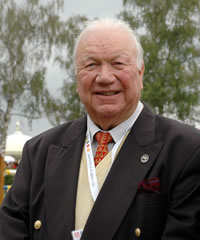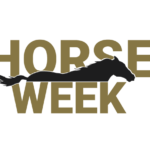November 21, 2007 — One of the equestrian world’s most bitter struggles has ended with former adversaries joining to create “The Aachen of the United States” at what will become a state-of-the-art expanded showgrounds in Wellington, Fla.

“We believe this is a great turning point for Welllington…in that what has been a very long process for everyone has come to a great win/win solution,” declared Mark Bellissimo, the managing partner of Wellington Equestrian Partners (WEP), during a press conference to announce the settlement today with Stadium Jumping.
U.S. Equestrian Federation CEO John Long said leaders of his organization are “ecstatic. We think it is a terrific outcome. Clearly, this is a huge win for everyone in Wellington and South Florida, but I must say this is also a huge win for all the U.S. and international equestrian sport as well. The notion that this facility could now become the Aachen of the United States is not just rhetoric.”
Approximately a year ago, disagreement about plans by Bellissimo’s group for a lavish showgrounds and development in the equestrian complex triggered waves of animosity through the wealthy local community and far beyond.
But after 12 extremely difficult months, opposing parties are working together in a coalition of some of the most powerful people on the hunter/jumper scene.
They are fashioning a new and superior facility, utilizing the core of the current Palm Beach Polo Equestrian Club property. With the addition of the old Palm Beach Polo Club polo stadium nearby for major grand prix, special competitions and dressage, the space issue of the old showgrounds is being solved as a new mecca geared to drawing international competitors is being developed.
WEP’s purchase of the old polo stadium grounds last summer was a turning point in the dispute, prompting prominent area property owners to push for a settlement that would keep the showgrounds in their neighborhood.
“We didn’t want to tear it apart, we wanted to put it together, and the road we were going down, we were tearing it apart…so we seized on that opportunity,” said Stadium Jumping Inc. founder Gene Mische, noting a settlement was in everyone’s interest for the good of the sport and their community.
“There’s a great opportunity here and both parties realize it,” said Bellissimo.
Stadium Jumping was a partner in Bellissimo’s original plan, then opposed it, triggering a wave of millions of dollars worth of lawsuits that have been dismissed as part of the agreement. Bellissimo said there was “a high level of disinterest” in what would happen to the old facility when he started making his original plans. The direction was not clear, he noted, and observing “that which does not kill you makes you stronger,” he pointed out, “in the end it went through a process (under which) a lot of people got interested and engaged. This is a better plan.”
The facility, covering more than 150 acres at two separate sites, is being called the Palm Beach International Equestrian Center. The property cost $135 million. Bellissimo said $5-6 million already has gone for improvements, and he anticipates another $5 million to $10 million will be spent over the next two to four years.
The U.S. Equestrian Federation has transferred dates from Stadium Jumping, which ran the Winter Equestrian Festival, to a new entity, Equestrian Show Holdings (ESH), which is owned by WEP, but no figures are being revealed about the amount paid for the coveted dates.
Those on the ESH board include longtime Stadium Jumping stalwarts Jerry Jacobs and his son Louis who opposed the original Bellissimo plan and led the charge for a new showgrounds several miles away, a concept that was opposed by landowners around the Equestrian Club grounds and now has been dropped. Craig Lindner, co-president of American Financial Group but best known in the show world as the owner of the fabulous hunter Strapless is also on the board and was instrumental in putting together the agreement. Mische–who created Wellington as a horse show destination–will serve as honorary chairman of ESH.
Stadium Jumping, as such, no longer will be involved in operating shows in Wellington after next month, but will continue to run other competitions, including Charlotte, N.C., and Lake Placid, N.Y. Mische and his nephew, Michael Morrissey, Stadium Jumping’s chief operating officer, will remain as consultants to ESH for three years.
Work is being done on the old polo stadium, where all-weather footing is being put down, and it is being converted into what Bellissimo called, “a spectacular high-performance area.” Lights will be installed so more night classes, which were few and far between during the WEF, can be held, and the big events seem likely to be staged on Friday and Saturday evenings to avoid conflict with events at the International Polo Club on Sunday afternoons in another part of town.
At the current showgrounds, work is being done to make better use of space, enhance footing and improve the traffic pattern through the facility. Those efforts will escalate after the WEF ends in March.
A number of uncertainties remain in connection with a facility that still is very much a work in progress.
One involves the National Horse Show. Set to start in two weeks, it will be run at the showgrounds for the last time by Stadium Jumping, since the latter entity won’t be handling any competitions in Wellington after next month.
Although the National may well stay in Wellington, it is run by an independent board. That panel has discussed moving to a different date and location to reunite the show with its prized equitation competition, the Maclay, now held at the Syracuse Invitational Sporthorse Tournament in November.
The former Winter Equestrian Festival shows in Tampa, on Florida’s West Coast, will expand from two weeks to three next year, culminating in the Budweiser American Invitational, but no longer will be a part of the festival. Asked if the Invitational might someday move to Wellington, Mische didn’t seem to think it was out of the question, but indicated he thinks it’s important for show jumping to have a competition in a major stadium like Tampa’s Raymond James football facility.
The future of the Tampa shows is unresolved at this point. ESH envisions holding shows from October through April in Wellington, probably as three circuits: fall, winter and spring.
The management team for the Winter Equestrian Festival and other competitions is set to include consultants Michael Stone of Ireland, the former international equestrian federation secretary-general and Simon Broooks-Ward, a British show impresario. Morrissey and Mische are a part of it, as are the senior and junior David Burtons who started the Littlewood shows on land adjacent to the Winter Equestrian Festival productions. But a question about who will handle the day-to-day management of the shows was not answered in detail. Neither was a query about what kind of development will go on around the edges of the property.






